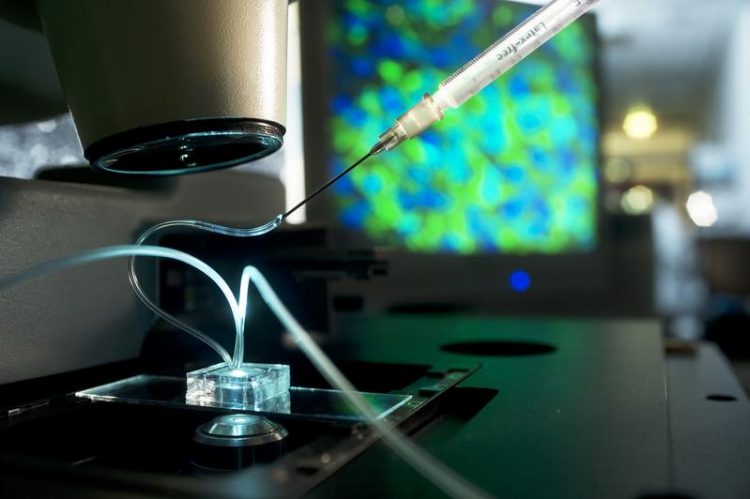European Organ-on-Chip Society open for active membership

An organ-on-a-chip replicates the smallest physiologically functional unit of an organ. Bernd Müller/Fraunhofer IGB
Organ-on-Chip (OoC) systems are among the latest emerging technologies for healthcare research. It is believed they will accelerate drug discovery, advance drug efficacy and toxicology testing and open new opportunities for personalized medicine.
“Organ-on-Chip systems can reduce and perhaps eventually replace animal experiments and provide predictive human data before expensive and lengthy clinical trials actually start,” vice-chair Peter Loskill says. The biophysicist heads the Organ-on-Chip research group at the Fraunhofer Institute for Interfacial Engineering and Biotechnology IGB in Germany.
Building a community network
Although the potential of OoC technology is high, it is also very complex. Organ-on-Chip systems hold human cells, tissues or mini-organs in mimics of their own microenvironment while they perform real-life tissue functions. This requires considerable interdisciplinary collaboration – especially between biology, engineering and physics, disciplines only recently in close contact.
“We established the European Organ-on-Chip Society to bring together all relevant stakeholders and build an expert network. In this way we provide a platform for exchange of scientific knowledge across disciplines and collaboration opportunities,” says Janny van den Eijnden-van Raaij, secretary of EUROoCS and managing director of the Dutch institute hDMT. “Involving all stakeholders at an early stage is key to success and rapid development of Organ-on-Chip technology.”
Many scientists with interest registered earlier are now invited to contribute and participate actively in the OoC community.
Making the difference
High on EUROoCs agenda is identifying “showcases” that demonstrate the potential of OoC-technology and how it can make a difference in discovery of safe and effective drugs. EUROoCs promotes the development of reliable and robust model systems, open technology platforms, standardization and discussion of ethical aspects.
“We have to work on approaches for the integration of physical or chemical sensors, and ensure that the test systems deliver reproducible and comparable results and can also be standardized from a regulatory point of view,” says board member Albert van den Berg, professor of sensor systems for biomedical and environmental applications at the University of Twente, the Netherlands.
“Furthermore, we need to think about the manufacturability and integration in the user’s workflow at an early stage if we want to have real impact.”
Membership benefits
The society is open to individual researchers and students worldwide and to individual representatives of industry and regulatory agencies. Anyone with a real interest in Organ-on-Chip technology is welcome to join and share ideas and knowledge. Member benefits include exclusive access to the digital platform (with forum, research projects and expert profiles), discounted registration for the annual conference and up-to-date information on advances and activities in the OoC field.
Jun.-Prof. Dr. Peter Loskill
Fraunhofer IGB
Attract Group Manager “Organ-on-a-chip”
Nobelstr. 12
70569 Stuttgart, Germany
Phone +49 711 970-3531
Fax +49 711 970-4200
https://www.igb.fraunhofer.de/en/press-media/press-releases/2019/euroocs-open-fo…
https://euroocs.eu/become-a-member/
Media Contact
All latest news from the category: Life Sciences and Chemistry
Articles and reports from the Life Sciences and chemistry area deal with applied and basic research into modern biology, chemistry and human medicine.
Valuable information can be found on a range of life sciences fields including bacteriology, biochemistry, bionics, bioinformatics, biophysics, biotechnology, genetics, geobotany, human biology, marine biology, microbiology, molecular biology, cellular biology, zoology, bioinorganic chemistry, microchemistry and environmental chemistry.
Newest articles

First-of-its-kind study uses remote sensing to monitor plastic debris in rivers and lakes
Remote sensing creates a cost-effective solution to monitoring plastic pollution. A first-of-its-kind study from researchers at the University of Minnesota Twin Cities shows how remote sensing can help monitor and…

Laser-based artificial neuron mimics nerve cell functions at lightning speed
With a processing speed a billion times faster than nature, chip-based laser neuron could help advance AI tasks such as pattern recognition and sequence prediction. Researchers have developed a laser-based…

Optimising the processing of plastic waste
Just one look in the yellow bin reveals a colourful jumble of different types of plastic. However, the purer and more uniform plastic waste is, the easier it is to…



